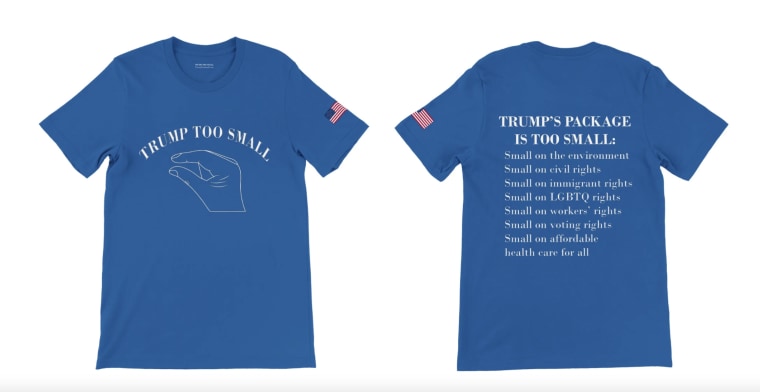WASHINGTON — No case is too small for the Supreme Court.
On Wednesday, the high court will hear arguments in a dispute over whether a California lawyer can trademark the phrase “Trump too small,” a reference to a bawdy joke that Sen. Marc Rubio, R-Fla., made about a sensitive part of Donald Trump’s anatomy.
Attorney Steve Elster is seeking to sell T-shirts featuring the phrase stemming from an exchange during a 2016 presidential debate in which Rubio made a crude comment when the size of Trump’s hands was being discussed.
“And you know what they say about guys with small hands,” Rubio said, leaving no doubt which part of the body he was referring to.
Elster, an employment lawyer and progressive activist, applied to register “Trump too small” with the U.S. Patent and Trademark Office in 2018. The slogan would appear on the front of the T-shirt, with “Trump’s package is too small” on the back.

His application was rejected because people would associate the word “Trump” with the then-president. The trademark office concluded that Trump’s written consent would be needed, as required under a 1946 law called the Lanham Act.
Elster argues that his free speech rights are violated if he cannot register a trademark that criticizes a public figure.
The consent provision “effectively precludes the registration of any mark that criticizes public figures—even as it allows them to register their own positive messages about themselves,” Elster’s lawyers wrote in court papers.
The U.S. Court of Appeals for the Federal Circuit ruled for Elster, saying his free speech rights under the Constitution’s First Amendment were violated.
The Biden administration, representing the trademark office, appealed. Solicitor General Elizabeth Prelogar wrote in court papers that the government has long refused to register trademarks of living people without their consent.
The Lanham Act does not restrict speech; instead, it imposes a condition on registering a trademark, she said.
“The only effect of the refusal is to deny an owner the benefits … that federal registration provides,” Prelogar wrote.
The case is the latest of several the Supreme Court has taken up recently concerning free speech rights in the trademark context.
In 2017, the court struck down a prohibition on trademarks that feature disparaging language, handing a win to an Asian American rock band called The Slants.
The court two years later threw out a ban on trademarks based on immoral or scandalous words, ruling in favor of the clothing brand FUCT.
Source: | This article originally belongs to Nbcnews.com









